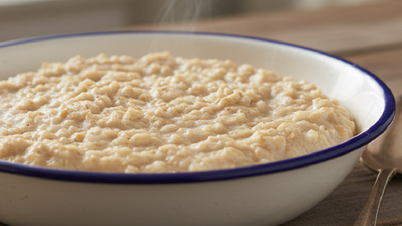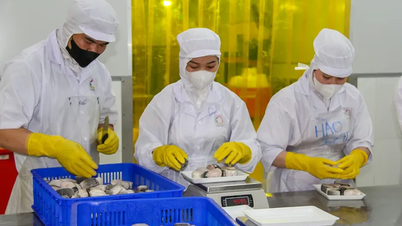
A balanced diet and exercise are effective ways to fight inflammation - Photo: CANVA
According to Science Alert, people often think of inflammation as something to avoid at all costs, but it's actually a healthy and normal process that helps the body heal itself and protect against infection, injury, or disease.
The body's inflammatory mechanism
Without inflammation, we would not be able to heal even minor injuries. Inflammation can be short-term (acute) or long-term (chronic). Acute inflammation is beneficial and is part of the normal healing process.
For example, a skinned knee becomes red, swollen, and hot as the skin repairs itself, or a throat swells as it fights an infection. Chronic inflammation, on the other hand, can be harmful and is linked to many chronic diseases, including heart disease, type 2 diabetes, and cancer.
Speaking to Tuoi Tre, Dr. Nguyen Huy Hoang - a member of the Vietnam Association of Underwater and Hyperbaric Oxygen Medicine - said that inflammation is an essential part of the immune system.
When you have a cut, sprain, or infection, your body immediately goes into a "fire alarm," causing the injured area to swell, become hot, red, and painful. This is acute inflammation, which causes white blood cells to rush in to clean up and repair the injury, and then the reaction shuts itself down. This inflammation is beneficial and necessary.
But if this reaction continues to smolder at a low level, called chronic inflammation, it is a different condition. People with chronic inflammation often feel tired, have body aches, have digestive disorders, poor sleep, and increase waist size. In the long term, this condition increases the risk of cardiovascular disease, diabetes, fatty liver, or dementia.
The cause often stems from an unbalanced diet, lack of exercise, prolonged stress, lack of sleep, pollution or a disordered intestinal microflora. "We do not need to eliminate inflammation, but need to regulate the inflammatory response so that the body reacts at the right time and at the right level," Dr. Hoang emphasized.
Health experts also say factors such as age, smoking, sedentary behavior, obesity, hormonal changes, stress, and irregular sleep patterns are all linked to chronic inflammation. Diet also plays a role.
A diet high in ultra-processed foods like packaged sweets, soft drinks, fast food, processed meats, and sweets, but low in fresh fruits and vegetables, leads to a higher risk of inflammation. In contrast, a diet rich in fruits, vegetables, whole grains, legumes, and healthy fats, and low in processed foods and added sugars, reduces inflammation.
Does the "anti-inflammatory diet" really work?
Many TikTok videos recommend probiotic supplements to reduce inflammation. While promising, scientists warn that more research is needed to determine which strains and dosages are most effective.
Meanwhile, the advice on TikTok to avoid dairy or gluten to reduce inflammation is not supported by science. Inflammation caused by dairy or gluten usually only occurs in people with allergies or celiac disease, in which case medically prescribed abstinence is necessary. Cutting out ingredients without reason can easily lead to unnecessary nutritional deficiencies.
Foods like yogurt, kefir, and some cheeses rich in probiotics are also helpful in reducing inflammation. Many people believe that eliminating gluten will reduce chronic inflammation, improve digestive problems, or improve fatigue. But there is little scientific evidence to support this. In fact, consuming whole grains has been shown to improve health by reducing inflammation.
For people with certain medical conditions, an anti-inflammatory diet may play a helpful role, alongside treatment.
Research suggests the diet may be beneficial for conditions such as polycystic ovary syndrome (PCOS), endometriosis, autoimmune diseases, and arthritis. In these conditions, chronic inflammation contributes to symptoms or disease progression. Dietary guidance from a nutritionist is recommended to ensure a diet is safe, balanced, and tailored to individual needs.
Don't eat too much or too extreme.
Dr. Hoang also said that many people believe that just by "following a trend" they can reduce inflammation and be healthy. However, many extreme diets have potential risks. Sugar and refined flour should be reduced, but there is no need to "say no."
High sugar causes the body to create "sticky" substances that damage cells and affect the intestines. Some substances from bacteria enter the blood, stimulating inflammatory reactions. High sugar also leads to insulin resistance and increased visceral fat.
So you can gradually reduce sugary drinks, eat whole fruit instead of juice, and switch from white bread and white rice to whole grains.
As for milk, depending on each individual's constitution, it is not necessary to completely eliminate it from the menu. When it can cause problems with milk protein allergy, lactose intolerance (bloating, diarrhea), some people with autoimmune diseases may not be able to use it.
However, with most milk being neutral or beneficial (especially yogurt because it is beneficial for the intestines), if you give up milk, you need to increase your intake and replace calcium, vitamin D, and protein (soft-boned fish, tofu, fortified plant milk, adequate sun exposure, etc.). As for gluten, experts also recommend abstaining only when diagnosed.
It is mandatory for people with celiac disease, wheat allergy or gluten sensitivity confirmed by a doctor. As for normal people, there is no evidence that gluten causes inflammation.
Many people are "healthier" because they cut down on ultra-processed foods when switching to a "whole" diet. The risk of "unreasonably" avoiding gluten is that it can lead to deficiencies in B vitamins, iron, and fiber; many "gluten-free" foods are made from refined flour and are quite expensive.
Balanced diet to protect health
If you’re healthy, you don’t need to eliminate entire food groups to reduce inflammation. Instead, focus on eating a balanced, varied, and minimally processed diet. Eat plenty of fruits and vegetables, plenty of fiber, and healthy fats. There’s no need to “avoid” everything like TikTok suggests.
What should I eat to fight inflammation?
Doctors say that in addition to a balanced diet, staying active, getting enough quality sleep, drinking less alcohol, and not smoking all help the body control inflammation effectively. These healthy habits work together to strengthen the immune system and reduce the risk of chronic disease.
Doctors recommend the Mediterranean diet as the safest and easiest to follow to "lower inflammation". Increase colorful fruits and vegetables, whole grains, beans, nuts, and extra virgin olive oil. Moderate fatty fish, eggs, white meat, and yogurt. Limit red meat, sweets, and ultra-processed foods.
Food groups that help "put out inflammation" naturally include fatty fish (omega-3), green leafy vegetables (vitamin K), berries (antioxidants), nuts (vitamin E), olive oil (mild anti-inflammatory), and natural spices such as turmeric, ginger, and cinnamon.
In addition, each person needs to exercise regularly for about 150-300 minutes/week (fast walking, cycling, swimming...) to help reduce "inflammatory substances" in the blood, increase the burning of visceral fat. Avoid overtraining when stressed or sleep deprived.
Reduce stress by meditating 10-15 minutes a day, breathing slowly, and doing light yoga to help lower "stress hormones", thereby reducing inflammation. Get enough sleep 7-9 hours a day, because even one night of sleep deprivation increases "inflammation".
Source: https://tuoitre.vn/thuc-hu-che-do-an-chong-viem-tran-lan-tiktok-20251021104515461.htm


![[Photo] Da Nang residents "hunt for photos" of big waves at the mouth of the Han River](https://vphoto.vietnam.vn/thumb/1200x675/vietnam/resource/IMAGE/2025/10/21/1761043632309_ndo_br_11-jpg.webp)


![[Photo] Prime Minister Pham Minh Chinh meets with Speaker of the Hungarian National Assembly Kover Laszlo](https://vphoto.vietnam.vn/thumb/1200x675/vietnam/resource/IMAGE/2025/10/20/1760970413415_dsc-8111-jpg.webp)
![[Photo] Prime Minister Pham Minh Chinh received Mr. Yamamoto Ichita, Governor of Gunma Province (Japan)](https://vphoto.vietnam.vn/thumb/1200x675/vietnam/resource/IMAGE/2025/10/21/1761032833411_dsc-8867-jpg.webp)





































































































Comment (0)